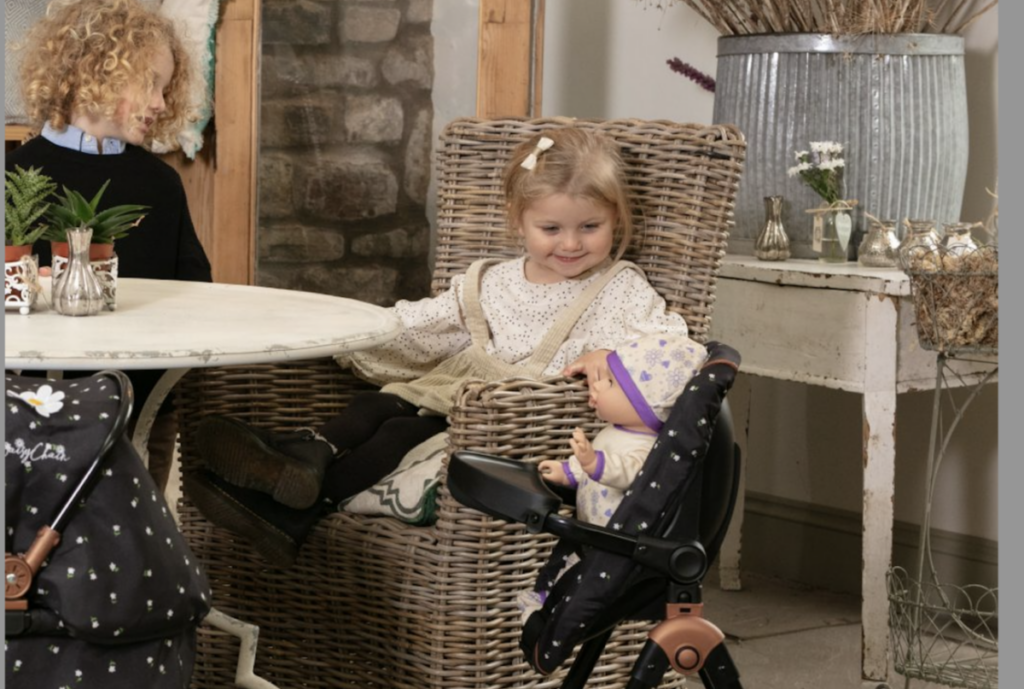From fostering a sense of caring to being more independent and empathetic, we all want our children to flourish and be the best they can be. Not only towards their peers and us, but to themselves as well.
The best way to do this is to prepare them for life in numerous ways. One way is to encourage their development through the use of play, and more specifically playing with interactive dolls.
This guide aims to look at the skills children develop through playing with dolls, how it can impact their growth – socially and emotionally – and why investing in a dolls pram or pushchair could be a great option for your little one!
The importance of playing with dolls
Play can be characterised in a variety of ways, and while some children will have their preferences, most play has positive impacts. Results include improved success in developmental milestones, particularly when children have the ability to choose how and what to play with.
There are numerous benefits to imaginative play for children, that’s why it’s best to encourage it from a young age in order to reap the benefits later down the line. Because imaginative play is so crucial for growing children, what better way to encourage their development than by playing with dolls?
Toys like dolls, prams and pushchairs can help youngsters develop social, emotional, and verbal skills (and many other skills) while also allowing them to use their imaginations. The sky really is the limit when it comes to playtime. Below are just some of the skills children develop through playing with dolls.
1 – Creativity
It is important to encourage creativity among children from a young age, this is because creative play aids their development. What’s more, they learn to explore what they like – be it reading, writing, painting – early on, and gives them a sense of self.
Another form of creative play is play that incorporates an object, or a doll. Something that the child can nurture, be it how they choose, can teach them creative ways to imagine a situation through pretend play, which is one of the most important aspects for development.
2 – Empathy
We all want our little ones to understand the importance of empathy, even from a young age. Doll play activates parts of the brain that allows children to develop empathy and social processing skills. Either alone or with others, spending more time in imaginary worlds will enable your children to gain skills needed later in life.
A study – conducted by Mattel, Co (Barbie) – observed 33 children who were given Barbie dolls and accessories to play with. By allowing themselves to be placed in a position of responsibility, and care, the study found that when left to play with dolls, children were more susceptible to understanding people’s feelings and listening to their needs.
3 – Independence
Playing with dolls can be a great way to get children to experience everyday situations and practise them themselves, so they can become more independent. For example, an interactive doll might need changing, dressing and washing.
Through these acts, children learn the methods in which adults, and older children look after themselves. By repeating these behaviours children become more independent.
In addition to practising independence, Susie interactive doll reacts to actions taken by the child. Such as:
- When you lie Susie down after being sat up, she will tell you that she is tired, snore and go to sleep.
- Shake Susie’s hands to get her to giggle.
- Stroke Susie’s back to soothe and send her to sleep.
This can aid in the developiment of their social, reactive and nurturing skills.
4 – Language
Through playing alone, or with others, children will develop language skills. Not just the standard “hello, what’s your name?”, being exposed to imaginative play environments can also teach children basic social cues. For example, when is their turn to speak, how not to interrupt others and so on.
5 – Imitates real-life situations
Many forms of play can be inspired by real-life situations, especially play using a prop like a doll. That’s because, when left to their own devices, children learn to mimic what is going on around them. Have you ever noticed your little one ‘playing house’? This is most likely a reflection of what they see you doing, and choosing to incorporate that into their own imaginative world.
Your child can practise using their fine motor skills by dressing, feeding, putting to sleep, bathing and changing the diaper of a doll. Over time, they will develop a greater understanding of the significance of these actions while playing with their doll.
6 – Imitates social situations
Have you ever left the house after not talking to anyone all day and forgotten the most simple of social skills? This rings true for our little ones, too. Playing and caring for a doll can teach a child to feel less anxious when approaching social situations, as they have a means to practise, so that participating doesn’t feel so daunting. This is particularly useful for shyer children who might be more reserved at nursery, or playschool.
What’s more, playing with dolls gives children an opportunity to express how they are feeling. For example, if they are angry, sad or frustrated – then imaginative play is a great method of handling these emotions head on.
7 – Fine motor skills
Fine motor skills can manifest in a child in many ways, including reaching, grasping and manipulating objects with their hands. This gives your child a chance to grow physically, using their muscles to develop their dexterity and strength.
-
 Daisy Chain Zipp Zenith Dolls Pushchair Accessory Pack in Bumblebee£32.99
Daisy Chain Zipp Zenith Dolls Pushchair Accessory Pack in Bumblebee£32.99 -
 Daisy Chain Luxury Tote Bag in Daisy Dot£23.99
Daisy Chain Luxury Tote Bag in Daisy Dot£23.99 -
 Daisy Chain Pinnacle Double Dolls Pram in Daisy Dot£159.99
Daisy Chain Pinnacle Double Dolls Pram in Daisy Dot£159.99 -
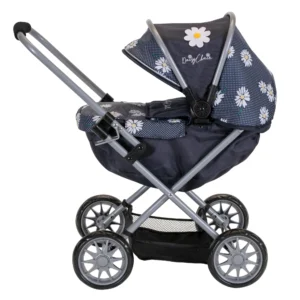 Daisy Chain Pocket Dolls Pram in Daisy Dot£47.99
Daisy Chain Pocket Dolls Pram in Daisy Dot£47.99 -
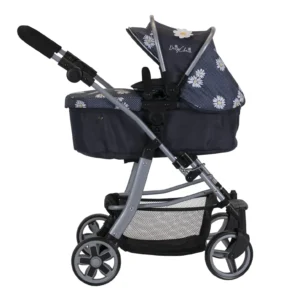 Daisy Chain Connect 5 in 1 Dolls Pram in Daisy Dot£73.99
Daisy Chain Connect 5 in 1 Dolls Pram in Daisy Dot£73.99 -
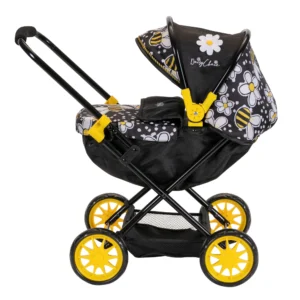 Daisy Chain Pocket Dolls Pram in Bumblebee£47.99
Daisy Chain Pocket Dolls Pram in Bumblebee£47.99 -
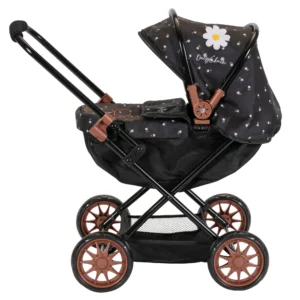 Daisy Chain Pocket Dolls Pram in Limited Edition Twilight£47.99
Daisy Chain Pocket Dolls Pram in Limited Edition Twilight£47.99 -
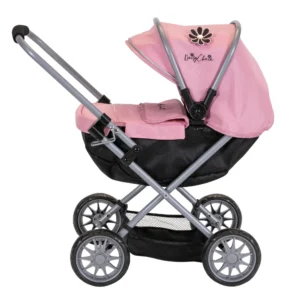 Daisy Chain Pocket Dolls Pram in Classic Pink£47.99
Daisy Chain Pocket Dolls Pram in Classic Pink£47.99 -
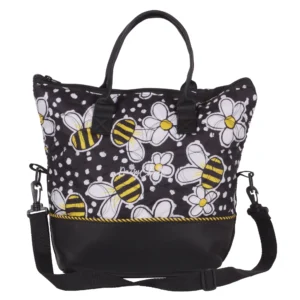 Daisy Chain Luxury Tote Bag in Bumblebee£23.99
Daisy Chain Luxury Tote Bag in Bumblebee£23.99
When to introduce playing with dolls to your children
You’ll want your children or infant to start holding and manipulating objects as soon as possible. Sensory toys are developmental tools for babies and it doesn’t stop as they get older. You’ll want your children to explore imaginative play throughout their childhood, but most definitely within their formative and key developmental years.
Because of this, playing with dolls and placing them on a pedestal as something that needs care and nurturing, is a terrific method to promote a wide range of useful life skills.
FAQs
At what age should a child start playing with dolls?
Between the ages of 2 and 3, toddlers will start to use their developing cognitive skills to engage in imaginative play. They will most likely mimic the actions that they see their parents doing, as well as, caring and nurturing the doll through acts such as feeding, rocking and dressing.
Why is playing with interactive dolls important for a childs development?
Whether alone, or with friends, playing with dolls is instrumental for a child’s development. It provides opportunities for emotional expression, cognitive skill development, fine motor skills and social interactions. What’s more, it teaches children creativity, empathy, communication and other important skills that can contribute to a child’s overall growth and development.
Discover tools for children’s development with Play Like Mum
Through imaginative play kids can learn a whole host of skills instrumental to their development. No matter how your child wishes to express themselves, our dolls prams and pushchairs are ideal for little ones aged from 18 months all the way to 12 years and older.
What’s more, we offer a wide range of dolls pram accessories including dolls high chairs, so your little ones can really start to get creative with play!
Need more information? Explore the Play Like Mum website – we are passionate about providing you with the tools and resources so you can help your child develop new skills.

